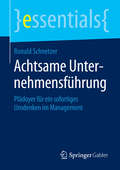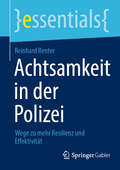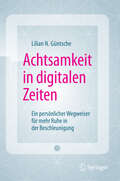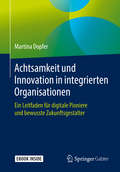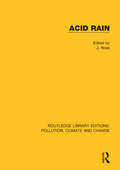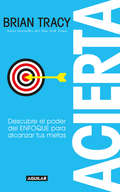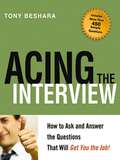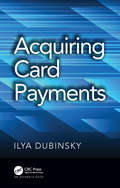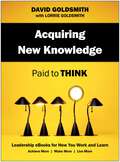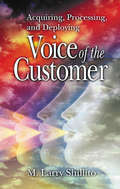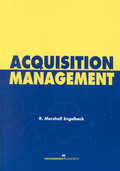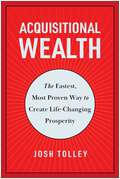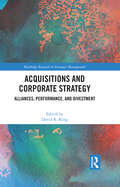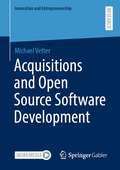- Table View
- List View
Achtsame Unternehmensführung: Plädoyer für ein sofortiges Umdenken im Management (essentials)
by Ronald SchnetzerKeine andere Betätigung bietet so viele Chancen, unseren Mitmenschen zu Lernprozessen und innerem Wachstum zu verhelfen, wie eine ganzheitlich verstandene Achtsame Unternehmensführung. Ronald Schnetzer gibt kompakt und verständlich Erfahrungen und Erkenntnisse aus über 20 Jahren Beratung, Coaching und Training im Bereich Prozessmanagement weiter. Er zeigt, wie Unternehmensführung, Prozessmanagement, Selbsterkenntnis, Burnout-Prävention und Work-Life-Balance zusammenhängen. Anhand von nachvollziehbaren Schritten und Beispielen wird gezeigt, wie Achtsame Unternehmensführung insbesondere mittels Achtsamen Prozessmanagements in Unternehmen umgesetzt wird, um mit leistungsfähigeren und zufriedeneren Führungskräften und Mitarbeitendennachhaltigen Erfolg zu erzielen.
Achtsamkeit in Arbeitswelten: Für eine Kultur des Bewusstseins in Unternehmen und Organisationen (FOM-Edition)
by Yong-Seun Chang-Gusko Judith Heße-Husain Manfred Cassens Claudia Meßtorff„Achtsamkeit“ ist ein im Gesundheitsbereich zunehmend beachtetes Thema. Etliche Unternehmen richten Achtsamkeitsseminare für ihre Mitarbeiterinnen und Mitarbeiter mit dem Ziel aus, die Gesundheit und Zufriedenheit der Belegschaft zu stärken, Produktivitätsverluste zu vermeiden und ihre Attraktivität als Arbeitgeber vor dem Hintergrund des demografischen Wandels zu stärken. Doch was genau ist unter Achtsamkeit zu verstehen und in welche Arbeitswelten hat sie Einlass gefunden? Und welche wissenschaftlichen Erkenntnisse zur Achtsamkeit liegen vor?Diesen und weiteren Fragen gehen die Autorinnen und Autoren in diesem Buch nach: Sie informieren zunächst über die Geschichte der Achtsamkeit und fassen Ergebnisse aus der Grundlagenforschung zu psychobiologischen Korrelaten der Achtsamkeit zusammen. Anschließend werden Herausforderungen, Bedarfe und bestehende Ansätze der Achtsamkeitsförderung in ausgewählten Arbeitswelten des Gesundheits- und Sozialwesens, der Verwaltung und Bildung sowie der Wirtschaft vorgestellt. In einem abschließenden Beitrag zur Evaluation eines achtsamkeitsbasierten Führungsprogramms werden Wege aufgezeigt, wie in Unternehmenskontexten eine wissenschaftlich qualitative Evaluationsstudie durchgeführt werden kann.Eine gelungene Verbindung von Grundlagenwissen und Praxisbezug, die Leser aus Wissenschaft und Praxis anspricht.
Achtsamkeit in der Polizei: Wege zu mehr Resilienz und Effektivität (essentials #13088)
by Reinhard RenterAchtsamkeitstechniken verbessern nachweislich psychische Gesundheit, Leistungsfähigkeit und Resilienz, wie zahlreiche Studien belegen. Doch wie lassen sich diese Techniken auf die besonderen Herausforderungen des Polizeidienstes anwenden? Die Antwort darauf gibt erstmals dieses Buch: Es zeigt, wie Achtsamkeit speziell in der Organisationskultur der Polizei effektiv entwickelt und erfolgreich implementiert werden kann. Im Mittelpunkt stehen dabei die Erkenntnisse aus dem Achtsamkeitsprogramm des Polizeipräsidiums Offenburg, ergänzt durch inspirierende Erfahrungsberichte von Teilnehmern und konkrete Anleitungen für Führungskräfte.
Achtsamkeit in digitalen Zeiten: Ein persönlicher Wegweiser für mehr Ruhe in der Beschleunigung
by Lilian N. GüntscheDieses Buch eröffnet Ihnen einen ganz neuen Blick auf das brand-aktuelle und wichtige Thema Achtsamkeit: Erfolgreich arbeiten und always-on sein und gleichzeitig sorgsam mit sich umgehen - ist das überhaupt möglich? Ja, ist es! Die Autorin, selber achtsamer Workaholic mit kreativen Hobbies und überzeugte Großstädterin, erzählt in diesem Buch ihre persönliche Geschichte, begleitet von inspirierenden Interviews sowie handfesten Werkzeugen, wie Sie effizienter, erfolgreicher, gesünder und glücklicher werden. Ein Must-read über Menschlichkeit in der digitalen Welt, ein Plädoyer für Persönlichkeit in der flüchtigen Anonymität und eine bestechende Anleitung für Ruhe in der Beschleunigung. Mit diesem Buch lernen Sie Ihre eigene Stimme im Lärm des Alltags wieder zu hören! Aus dem Inhalt * Warum und wie Achtsamkeit mit leidenschaftlichem Arbeits-Spirit verbunden werden kann (und muss). * Wie Sie in der Beschleunigung entschleunigen. * Wie Sie eine gesunde Balance zwischen virtuellem und realem Leben finden und trotz der Fülle an Informationen fokussierter und zufriedener werden. Die Autorin Lilian Güntsche, CEO & Founder von Güntsche Concepts und The Dignified Self ist seit über zehn Jahren im Marketing- und Kommunikationsumfeld der Technologie- und Medienbranche aktiv. Sie unterstützt namhafte Industriekunden und Agenturen in der digitalen Strategieentwicklung, Projektsteuerung und im Marketing. Lilian Guntsche ist zudem Autorin und Sprecherin zum Thema Achtsamkeit sowie Jurymitglied in verschiedenen Branchengremien zu den Themen Mobile Health und Innovationen. Sie hat eine Leidenschaft fur Gesang, Meditation, Yoga und Reisen und lebt in Berlin.
Achtsamkeit und Innovation in integrierten Organisationen: Ein Leitfaden für digitale Pioniere und bewusste Zukunftsgestalter
by Martina DopferDieses Buch verbindet Methoden der Achtsamkeit mit Innovationsinstrumenten. Autorin Martina Dopfer demonstriert darin, wie Sie diese aktiv in den Organisations- und Arbeitsalltag integrieren können. Das Werk greift zum Beispiel die Frage auf, wie in Zeiten der Digitalisierung und des Wandels Führung und Mitarbeiter gemeinsam unternehmerisch denken können. Anhand aktueller neurowissenschaftlicher Erkenntnisse, zeigt es Wege auf, mit Risiken umzugehen, Sinn als Wachstumschance zu sehen und Scheitern als Lernerfahrung anzunehmen.Indem sie die wissenschaftliche Forschung zu Achtsamkeit und Innovation in Verbindung zu über 1.000 Jahre alten Methoden bringt, verbindet die Autorin zwei Welten. Sie macht deutlich, warum innovative Führung von morgen eine Befähigung von Mitarbeitern bedeutet. Erfolgreich führen heißt, Mitarbeiter zu befähigen, gemäß ihrem Sinn unternehmerisch zu agieren und sie zu Offenheit und Innovation zu ermutigen.Übungen für mehr Achtsamkeit, die leicht in den (Arbeits-)Alltag einzubauen sind und Tests zur Selbstreflexion machen das Buch zu einem wertvollen Leitfaden für Personalentwickler, Führungskräfte und Unternehmer, sowie für jeden, der persönlich und beruflich wachsen möchte.
Acid Rain
by J. RoseOriginally published in 1994 this volume includes contributions from environmental scientists, consultants and research workers. The incidence and effects of the phenomenon of acid rain in the late 1970s, 80s and early 1990s , as well as certain remedies, are discussed at length. The roles of vehicles and power stations are examined in detail and legal aspects of curbing acid rain are considered.
Acid Rain: The Southern Co. (A)
by Forest ReinhardtThe Southern Co., an electric utility, is planning its compliance with the 1990 amendments to the Clean Air Act. The Act established a system of tradeable permits for sulfur dioxide emissions. The company must decide whether to install pollution control equipment and generate excess permits for sale to other firms, or to emit larger quantities of sulfur dioxide, save capital costs, and purchase pollution permits. Can be used to teach discounted cash flow analysis of a make versus buy decision. Also raises issues of expected cost minimization, questions of economic and political uncertainty, and the value of flexibility.
Acierta: Descubre el poder del ENFOQUE para alcanzar tus metas
by Brian Tracy¿Cómo desarrollar un hábito de alto rendimiento para toda la vida? La respuesta es el enfoque, la claridad y la concentración. En Acierta, el autor bestseller de The New York Times y uno de los mejores oradores y autores en el mundo sobre liderazgo y éxito, Brian Tracy, describe los pasos clave que puedes tomar para desarrollar las habilidades mentales más importantes que necesitarás para alcanzar el éxito: claridad, enfoque y concentración. Tu objetivo en la vida debe ser lograr todas las cosas maravillosas que son posibles para ti: anotar alto -dar en el blanco, en el centro de la diana-, en cada cosa que te propongas. Aprenderás cómo desencadenar tus poderes para el éxito y lograrás más en los próximos meses de lo que muchas personas logran en varios años. ¡Buena suerte!
Acing the Interview: How to Ask and Answer the Questions That Will Get You the Job
by Tony BesharaAcing the Interview
Acknowledge the Fog of the Future: How Chinese Entrepreneurs Confront Limited Visibility in Unpredictable Markets
by Donald N. SullManagers must rethink their view of time in order to compete effectively in unpredictable markets like China. They should adopt an unfolding view of time, called the "fog of the future," in which a steady stream of unanticipated threats and opportunities emerge.
Acme Investment Trust
by Josh LernerAcme Investment Trust is considering investing in a private equity partnership that is seeking only 15% of the profits, instead of the standard 20%. The management fee requested, however, is higher than in its earlier fund. The pension managers must consider the financial and organizational consequences of this shift.
Acme Investment Trust: January 2001
by Josh LernerThe managers of a large corporate pension fund must decide whether to invest in a private equity fund that is offering a guaranteed rate of return of 20% on part of its portfolio. The background behind and implications of the guarantee are explored.
Acoustic Emission: Methodology and Application (Foundations of Engineering Mechanics)
by Zinoviy Nazarchuk Valentyn Skalskyi Oleh SerhiyenkoThis monograph analyses in detail the physical aspects of the elastic waves radiation during deformation or fracture of materials. It presents the methodological bases for the practical use of acoustic emission device, and describes the results of theoretical and experimental researches of evaluation of the crack growth resistance of materials, selection of the useful AE signals. The efficiency of this methodology is shown through the diagnostics of various-purpose industrial objects. The authors obtain results of experimental researches with the help of the new methods and facilities.
Acova Radiateurs
by Lisa MeulbroekIn March 1990, Baring Capital Investors faced a decision about whether and how much to bid for Acova Radiateurs, a subsidiary of Source Perrier. Source Perrier had decided to sell Acova, and Baring Capital Investors thought it might make a good leveraged buyout candidate.
Acquired Tastes
by Peter MayleInternationally bestselling author of A Year in Provence, Mayle comes out with a new bestseller about the true pleasure of fine living.
Acquiring Card Payments
by Ilya DubinskyThis book delves into the essential concepts and technologies of acquiring systems. It fills the gap left by manuals and standards and provides practical knowledge and insight that allow engineers to navigate systems as well as the massive tomes containing standards and manuals. Dedicated to card acquiring exclusively, the book covers: Payment cards and protocols EMV contact chip and contactless transactions Disputes, arbitration, and compliance Data security standards in the payment card industry Validation algorithms Code tables Basic cryptography Pin block formats and algorithms When necessary the book discusses issuer-side features or standards insomuch as they are required for the sake of completeness. For example, protocols such as EMV 3-D Secure are not covered to the last exhaustive detail. Instead, this book provides an overview, justification, and logic behind each message of the protocol and leaves the task of listing all fields and their formats to the standard document itself. The chapter on EMV contact transactions is comprehensive to fully explain this complex topic in order to provide a basis for understanding EMV contactless transaction. A guide to behind-the-scenes business processes, relevant industry standards, best practices, and cryptographic algorithms, Acquiring Card Payments covers the essentials so readers can master the standards and latest developments of card payment systems and technology
Acquiring New Knowledge: Paid to Think
by David GoldsmithDon't let the seemingly dull title deceive you; the powerful lessons here will show you why past desires to effect change haven't worked and provide you with the secret that will drastically improve your ability to achieve results you have only imagined.
Acquiring, Processing, and Deploying: Voice of the Customer
by M. Larry ShillitoDo you want a better understanding of who your customers are? Do you want to learn how to acquire the customer voice? The next decade will be the decade of the customer. Meeting their wants, needs, and desires better than anyone else will be paramount to your organization's success. Acquiring, Processing, and Deploying Voice of the Customer gives y
Acquisition Management
by R. M. EngelbeckYour Step-by-Step Guide to Today's Best Procurement Practices"Acquisition Management is a great book for those in the government acquisition business. It is complete and well documented. I was especially impressed with the format which makes it valuable for training people new to the acquisition field and as a reference to those with more experience."Brig. Gen. James C. Dever, Jr.USAF (Ret.)Formerly, DCS Contracting and Manufacturing, Air Force Systems CommandWhether you're a contractor or government personnel, one thing is for sure: The federal procurement process is undergoing a major overhaul. And, to be successful, you must master a host of new methods, rules, and requirements. New from Management Concepts, Acquisition Management is the first step-by-step guide to the government's new strategies and methods for procurement.This new, streamlined acquisition process adopts the best practices of the business world to boost cost-efficiency and reduce the time from contract development to delivery. Acquisition Management prepares you fully to understand and apply these new acquisition techniques, teaching you how to manage contract risk and work more effectively as a member of a multi-functional team.Key Features• Reviews acquisition principles to help you develop a basis for decision-making• Gives you step-by-step guidance for every phase of the process, from solicitation to closeout• Places the procurement process in a risk management context to help you troubleshoot problems and ensure success• Outlines the roles and tasks of major players in the process to help you work more effectively as part of the contracting team• Presents pertinent information from the FAR at each applicable point in the acquisition process
Acquisition of Consolidated Rail Corp. (A)
by Benjamin C. Esty Mathew Mateo MillettOn October 15, 1996, Virginia-based CSX and Pennsylvania-based Consolidated Rail (Conrail), the first and third largest railroads in the eastern United States, announced their intent to merge in a friendly deal worth $8.3 billion. This deal was part of an industry-wide trend toward consolidation and promised to change the competitive dynamics of the Eastern rail market. Students, as shareholders, must decide whether to tender shares into the front-end of a two-tiered acquisition offer. To make this decision, they must value Conrail as an acquisition target and understand the structure of CSX's offer.
Acquisition of Consolidated Rail Corp. (B)
by Benjamin C. Esty Mathew Mateo MillettEight days after CSX announced it was going to buy Consolidated Rail (Conrail) for $88.65 per share, Norfolk Southern made a hostile $100 per share bid for Conrail. Over the next several months, the potential acquirers upped their bids while exchanging criticism in the popular press, prompting analysts to call this one of the nastiest takeover battles of the 1990s. The case is set in January 1997, just before Conrail shareholders are scheduled to vote on the proposed deal with CSX. It analyzes the trend toward consolidation in the U.S. railroad industry, the bidding war for Conrail, and the various provisions in Pennsylvania's anti-takeover laws, which restrict the market for corporate control. It also explores the strategic and financial implications of a bidding war and challenges the assumption that failure to acquire is a zero net present value endeavor. Finally, it examines the nature of and economic basis for regulating the market for corporate control.
Acquisitional Wealth: The Fastest, Most Proven Way to Create Life-Changing Prosperity
by Josh TolleyDiscover the fastest, safest proven method of creating wealth in the history of the world. For millennia, the wealthiest amongst us—including Warren Buffet, Elon Musk, and so many others—have known the secret to real wealth creation. Find out how you can access the same results in as little as 90 days. If you&’ve had a job longer than a year, you probably wish there was a way to leapfrog ahead of where you are financially. With this life-changing approach, you can go from earning $50K per year to $500K with the stroke of a pen. Acquisitional Wealth is a time machine for wealth that will teach you how to: Buy a proven and profitable business and instantly reap the profits Use your 401(k) as your down payment without taxes or penalty fees Make sure you know how to identify the right business for you Provide the information you need to negotiate a great deal and keep the profits coming for years to come Avoid the wrong businesses that might appear cheap but end up costing you a fortune From Josh Tolley, leading business strategist and host of The Josh Tolley Show and Acquisitional Wealth, this methodology is easy to put into action regardless of age, income, education, or other typical limiting factors. All you need to decide is how soon you&’re ready to get started.
Acquisitions and Corporate Strategy: Alliances, Performance, and Divestment (Routledge Research in Strategic Management)
by David R. KingCorporate restructuring (acquisitions, alliances and divestment) is a visible form of corporate strategy. For example, firm investments in buying and selling assets exceed the gross domestic product of the majority of nations. Most research in this area examines acquisitions, but informing practice is limited by examining acquisitions in isolation or using a narrow focus. For example, a lingering problem is that average acquisition performance is consistently around zero, suggesting a need to identify practically relevant relationships. In addressing this need, research on three fundamental questions is covered: 1) How do acquisitions relate to other corporate strategy options?; 2) What helps to predict acquisition performance?; and 3) What are persistent acquisition research issues? The first question is intended to overcome a research limitation that acquisitions are often examined independent of other corporate strategies, including internal development, alliances, and divestment. The second question addresses novel relationships associated with the primary focus of acquisition research in examining what drives acquisition performance. The third question reflects on the underlying complexity of the phenomenon that makes it a challenge to identify what drives acquisition performance. Overall, the intent of presenting ideas on these fundamental questions is to illustrate promising areas for future research. This book presents the latest state of knowledge on the topic and will be of interest to researchers, academics, and advanced students in the fields of strategic management, international business, and organizational studies.
Acquisitions and Open Source Software Development (Innovation und Entrepreneurship)
by Michael VetterParticipation of firms in Open Source Software (OSS) development is steadily increasing. In fact, a substantial part of OSS projects today are developed in informal collaboration between firms and a community of voluntary contributors. As more and more firms are active in OSS, acquisitions of firms active in OSS development occur increasingly often. Yet, despite the economic and practical importance of OSS, research has so far overlooked this phenomenon. This dissertation explores this phenomenon of acquisitions of firms active in OSS development. Michael Vetter examines the role of OSS in the pre-acquisition phase and the impact of acquisitions on OSS development in the post-acquisition phase. Using qualitative and quantitative research methods, the author examines acquisition motives, acquisition likelihood, timing of acquisitions, and outcomes of acquisitions and discuss mechanisms behind variations across acquisitions.The findings from the studies contribute to research on acquisitions and OSS development while also providing insights into how to leverage OSS in target search, selection and evaluation processes as well as how to effectively manage acquisitions of firms active in OSS and the communities around them.
